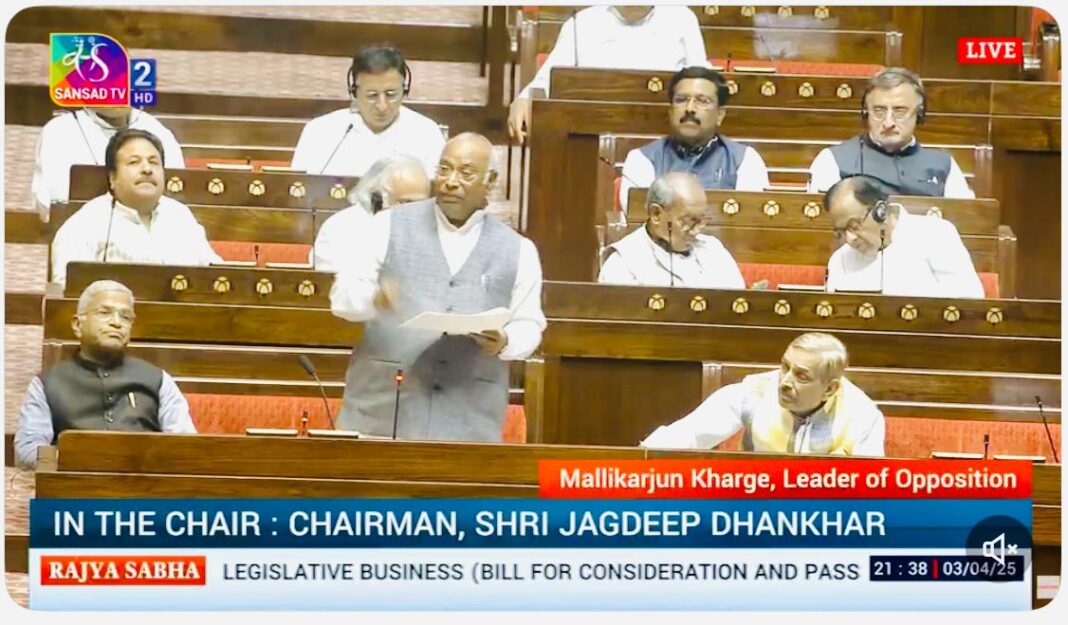Opposition Raises Alarm Over Potential Disputes, Calls for Reconsideration
New Delhi – The Waqf Amendment Bill has triggered a heated debate in the Rajya Sabha, with Leader of Opposition (LoP) and Congress President Mallikarjun Kharge strongly opposing the legislation. Addressing the House, Kharge warned that the bill could lead to disputes across the country and urged the government to withdraw it.
During the debate, Kharge accused the government of sowing seeds of discord by introducing amendments that, according to him, go against the interests of Muslims and the constitutional principles of secularism and minority rights.
“What you are doing is not good. This will lead to disputes in the country. You are sowing seeds for disputes… I appeal to the Home Minister to withdraw this. Don’t make this a prestige issue. What is the harm in rectifying the errors?… Amendments were made to the Constitution of the country. So, it is correct to withdraw it. This is not good for Muslims. This is against the Constitution,” Kharge asserted.
His remarks reflect a growing concern among opposition parties and minority communities over the implications of the bill on Waqf properties, religious institutions, and minority rights.
The Waqf Act, 1995, governs the administration and management of Waqf properties in India. These properties, donated for religious or charitable purposes, are meant to be protected from sale, transfer, or misuse.
The proposed Waqf Amendment Bill seeks to introduce changes that opposition leaders claim could dilute existing protections and pave the way for government intervention in Waqf assets. The government, however, maintains that the amendments aim to streamline Waqf administration, prevent encroachments, and ensure transparency.
Key Concerns Raised by the Opposition :
Opposition parties argue that the bill could lead to increased government interference in the management of Waqf properties. The concern is that state governments may be empowered to take over or reallocate Waqf lands, potentially affecting mosques, madrasas, and other religious institutions.
Kharge and other leaders have warned that the bill could create legal conflicts over land ownership, leading to disputes between communities. Many believe that this could aggravate religious tensions at a time when communal harmony is already under strain in several states.
Critics argue that the bill is against the fundamental rights of the Muslim community, as guaranteed under Articles 25-30 of the Constitution, which protect religious freedoms and minority institutions. Any dilution of Waqf protections could undermine the autonomy of Muslim religious endowments.
Citing previous instances where the government repealed or amended laws after public backlash, Kharge insisted that the Waqf Bill should also be reconsidered if it contains errors or ambiguities. He urged the Home Minister not to treat the bill as a “prestige issue” and to prioritise consensus over political motives.
Government’s Justification for the Bill
Despite the opposition’s concerns, the government has defended the bill, claiming that: It aims to remove bureaucratic inefficiencies in Waqf management. It seeks to curb illegal occupations and misuse of Waqf lands. The bill will ensure greater transparency and accountability in Waqf administration.
Will the Government Reconsider?
With mounting pressure from the opposition and protests from Muslim organisations, the government may face hurdles in passing the bill smoothly. Legal experts, minority leaders, and community representatives are expected to weigh in on the issue, potentially influencing the government’s next move.
For now, the debate in Rajya Sabha underscores a broader battle over minority rights, religious autonomy, and the government’s approach to legislative changes affecting India’s diverse communities. Whether the government chooses to withdraw, amend, or push forward with the bill remains to be seen in the coming weeks.








cheap clomid prices buy clomid without dr prescription can i purchase cheap clomiphene without a prescription cost cheap clomid prices can i buy cheap clomiphene where to buy clomid cost of generic clomiphene without insurance
Thanks recompense sharing. It’s acme quality.
More posts like this would bring about the blogosphere more useful.
where to buy zithromax without a prescription – buy azithromycin 500mg generic metronidazole 200mg sale
buy rybelsus 14 mg online cheap – buy periactin 4mg generic order cyproheptadine
motilium 10mg over the counter – cyclobenzaprine 15mg price order cyclobenzaprine generic
buy inderal 10mg sale – buy generic propranolol for sale order methotrexate
order zithromax 250mg generic – zithromax 500mg price bystolic 5mg usa
oral nexium 20mg – anexa mate esomeprazole brand
buy coumadin 2mg without prescription – blood thinner purchase losartan for sale
cheap mobic 7.5mg – swelling mobic 7.5mg over the counter
order generic deltasone 10mg – https://apreplson.com/ deltasone 40mg uk
over the counter erectile dysfunction pills – https://fastedtotake.com/ buy ed pills no prescription
order amoxil pills – buy amoxicillin for sale purchase amoxicillin pills
order cenforce 100mg online cheap – click order cenforce 100mg for sale
when will teva’s generic tadalafil be available in pharmacies – buy cialis online from canada cialis no prescription
purchase zantac generic – buy zantac online cheap buy ranitidine 300mg
over the counter drug that works like cialis – https://strongtadafl.com/ cialis dapoxetine
More posts like this would add up to the online space more useful. comprar provigil madrid
Thanks recompense sharing. It’s top quality. prednisone for migraine headaches
Thanks on putting this up. It’s well done. https://ursxdol.com/clomid-for-sale-50-mg/
With thanks. Loads of knowledge! https://prohnrg.com/product/atenolol-50-mg-online/
Thanks for putting this up. It’s understandably done. https://aranitidine.com/fr/acheter-cialis-5mg/
With thanks. Loads of expertise! https://ondactone.com/spironolactone/
Facts blog you procure here.. It’s hard to espy strong status article like yours these days. I honestly comprehend individuals like you! Rent mindfulness!!
buy clopidogrel no prescription
Thanks for sharing. It’s outstrip quality. http://anja.pf-control.de/Musik-Wellness/member.php?action=profile&uid=4711
purchase forxiga pills – click generic dapagliflozin 10mg
xenical order online – purchase xenical online cheap orlistat for sale online
More posts like this would make the blogosphere more useful. https://myrsporta.ru/forums/users/ulaie-2/
More posts like this would bring about the blogosphere more useful. dominique levitre
Greetings! Very gainful par‘nesis within this article! It’s the crumb changes which liking obtain the largest changes. Thanks a quantity in the direction of sharing!
Khám phá thế giới giải trí trực tuyến đỉnh cao tại MM88, nơi mang đến những trải nghiệm cá cược thể thao và casino sống động.
kuwin sở hữu kho game đa dạng từ slot đến trò chơi bài đổi thưởng, mang đến cho bạn những giây phút giải trí tuyệt vời.
bet mgm md online casino betmgm play betmgm NV
Enjoy betting on sports and casino games. crowncoins casino guarantees fairness and variety. Join the community of winners!
Sweet Bonanza combines cute visuals with serious winning power — perfect for casual and sweet bonanza demo high-rollers alike. Ante bet or bonus buy? You decide. Spin and win!
Ready to win big without risking a dollar? play chumba casino free Sweeps Coins welcome offer is your ticket. Spin and redeem — it’s that simple!
Want anonymous crypto gambling with huge multipliers? stake mobile has been delivering it for years. Jump in.